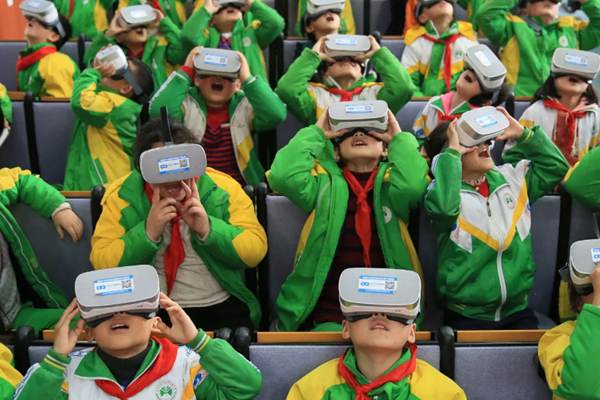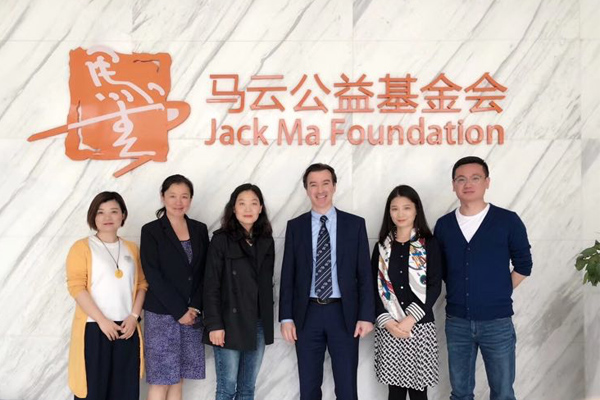by
User Not Found
| May 31, 2018
Hamish Curry, Executive Director, Asia Education Foundation

Picture a perfectly still pond of water. Mirror-like. A single drop of water hits the surface and measured ripples spread across the pond.
Recently, with my best imitation of this sound, I began my keynote speech at the Grand Canal-Gongshu Education Forum in Hangzhou, China. I used that analogy to encourage the 600 attendees - including Australian school leaders and educators - to begin to see the small steps that are necessary to grasp new insights, ideas and initiatives in education.
But even before I'd walked on to the stage in Hangzhou, I was struck by the education ambition and infrastructure unfolding in China.
Hangzhou’s economy, thanks to ecommerce industries like Alibaba, is China’s fourth largest. The city, located in southeast Chinawith a population of almost 9.5 million people, is investing heavily in education at multiple levels. For example, Daguan Middle School Education Group in Hangzhou, is building one of the largest Science, Technology, Engineering and Mathematics (STEM) centres in the country.
The ripples of change are indeed spreading through China.
Throughout the Education Forum, Principal after Principal walked on stage and drilled home key statements like, 'A good diploma does not necessarily make a good life' and 'Physical and mental health are more important than test scores.' Can you see many Australian Principals making those statements in front of a few hundred of their peers?
The ripples of change are spreading faster and with more commitment than I currently see in Australia.
However, there are huge issues of equity and bureaucracy to navigate in China while permission is one thing, courage to change is another. This is true for Australia too.
Some of these issues were powerfully brought home in an in-depth meeting I had with the Jack Ma Foundation. The charity was launched in 2014 by Jack Ma, founder and chairman of Alibaba Group. This year, the Foundation is investing significant funds, technology, and program streams in addressing how best to support rural education and educators.
One solution is providing a greater number of high-quality education graduates with incentives that encourage them to work at rural schools. In December 2017, the Foundation announced plans to invest around 45 million US dollars over the next ten years to encourage graduates to teach in rural areas. Graduates would also receive five years of professional learning support. Before founding his e-commerce empire, Ma was an English teacher in Hangzhou and he has become a passionate and committed advocate for improvements in rural education.
Bridging the tech-divide is also key.

Asia Education Foundation Executive Director, Hamish Curry and the Jack Ma Foundation board of directors.
While the scale of the issue is significantly different, these ambitions mirror the challenges facing Australia's education system.
Directors at Bureau and Provincial levels have spoken of the push for capabilities as key criteria for learning. These include capabilities like creative problem solving skills and ‘fostering the scientific spirit’ in children as key priorities. This is about learning that is designed to connect children to the environment, to connect them to business technology, and learning that connects children to each other as key elements in China’s education programs today.
These are supported by the development of impressive teacher-training centres, like the building at the Yuhang Education Bureau that is home to 14 floors of diverse education labs and a four-court physical education complex. I also visited the Cross-Border Trade Town in Hangzhou that covers a whopping 2.9 square kilometers and was built to drive new international services and entrepreneurship.
Standing on that site, I could see how an 'innovative, invigorated, interconnected, and inclusive' society was coming to life. This description was taken directly from the theme of the G20 Summit held in Hangzhou in 2016…And it is already being built.
The ripples that deepen learning are on our doorstep. The connections to education change, curriculum capabilities and better infrastructure are certainly there. There are opportunities for Australia to develop stronger inter-cultural relations with education leaders and institutions in China.
Universities like East-China Normal in Shanghai are gunning to offer 'double-first rate' courses and accolades. Innovative schools like Beijing Academy are scaling up beyond middle years into primary and high school mega-centres. They are using the powerful lessons of student-driven learning that they have become renowned for.
I spoke at the conference of how design thinking works best when you navigate complex systems and problems and drive hard at simple effective solutions. That concept certainly resonated.
While in Australia we continue to wrestle with making commitments to Gonski and we struggle with the fragmented layers of our own education system, China is well and truly ready to transform key aspects of its own education systems.
Feature: Getty Images
A version of this article was first published on Pursuit. Read the original article.
Comment